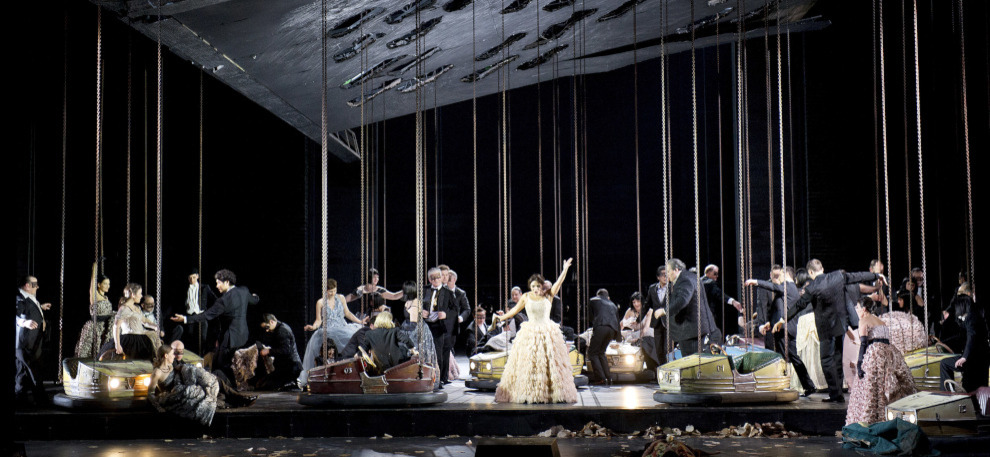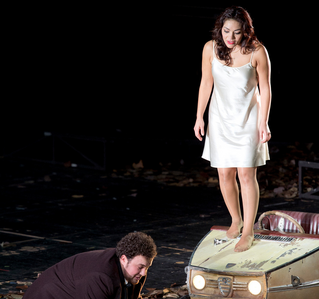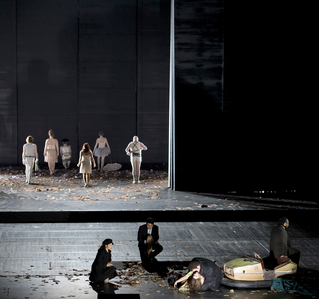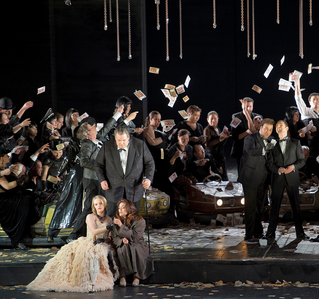Mi 07.01.2026, 19.00 - 21.40 Uhr | Großes Haus
Giuseppe Verdi
La Traviata
Violetta ist die begehrteste Kurtisane der Pariser Halbwelt. Doch die Begegnung mit Alfredo stellt ihr Leben im Rausch in Frage: Sie verlieben sich und versuchen, ein gemeinsames Leben abseits der schnellen Vergnügungen in der Stadt aufzubauen. Ihre Vergangenheit indes lässt Violetta nicht los. Alfredos Vater bewegt sie um der Familienehre willen zur Trennung. Alfredo, der die wahren Hintergründe ihrer Entscheidung nicht kennt, demütigt Violetta in aller Öffentlichkeit. Als beide wieder zueinander finden, bleibt Violetta keine Zeit mehr.
Nach solch einem provokanten, neuartigen Stoff hielt Giuseppe Verdi Ausschau, als er auf den Roman „La Dame aux Camélias“ von Alexandre Dumas dem Jüngeren stieß. Im Frühjahr 1852 sah er dann die vom Dichter zum Schauspiel umgestaltete „Kameliendame“ im Vaudeville-Theater in Paris. Der Eindruck bestärkte seinen Entschluss, sich des Stoffes für seine nächste Oper zu bedienen: Die Geschichte gab ihm die Gelegenheit, sein großes Thema, die an gesellschaftlichen Widerständen scheiternde Liebe, neu zu formulieren.
Inszenierung: Johannes Erath
Bühnenbild: Annette Kurz
Kostüme: Herbert Murauer
Licht: Olaf Freese
Dramaturgie: Francis Hüsers
Premiere am: 17.02.2013
Eine Pause von ca. 25 Minuten nach dem zweiten Bild (nach ca. 75 Minuten)
Altersempfehlung: Ab 14 Jahren/Klasse 9
In italienischer Sprache mit deutschen und englischen Übertiteln
1. Bild
Violetta lässt sich feiern, sie ist die schönste und teuerste unter allen Kurtisanen, doch sie leidet an der Schwindsucht und muss mit einem frühen Tod rechnen. Der junge Alfredo Germont, der sie schon länger aus der Ferne anhimmelt und ihr endlich vorgestellt wird, will sich ernsthaft in sie verliebt haben. Violetta ist verwirrt: Soll sie das Angebot echter Liebe annehmen und ihr bisheriges Leben aufgeben oder sich weiter nur den schnelllebigen Vergnügungen hingeben?
2. Bild
Alfredo und Violetta sind aufs Land gezogen, wo Alfredo sich mit ihr wie im Himmel fühlt und sich über die Kosten dieses Lebens keine Sorgen macht. Er findet aber heraus, dass Violetta zur Finanzierung ihres Landlebens nach und nach ihren ganzen Besitz verkauft. Während Alfredo nach Paris fährt, um die Verkäufe durch Verwendung seines Erbes aufzuhalten, kommt Alfredos Vater, Giorgio Germont, zu Violetta und bittet sie, sich von Alfredo zu trennen. Ihre Vergangenheit lasse eine Ehe mit Alfredo nicht zu und verhindere zudem die glückliche Heirat von Alfredos Schwester, deren Bräutigam eine Verbindung mit der Familie ablehne, wenn die ehemalige Kurtisane mit dem Bruder der Braut zusammen bliebe. Unter großem Schmerz stimmt Violetta schließlich zu, Alfredo für das Familienglück der Germonts zu verlassen. Sie schreibt ihm einen Abschiedsbrief. Als er aus Paris zurückkommt, versucht sie ihm vorzuspielen, dass alles normal sei und lässt ihn unter einem Vorwand allein. Alfredo liest ihren Trennungsbrief, während sein Vater schon bereit steht, um ihn zu trösten. Aber Alfredo ist nur wütend, beleidigt und enttäuscht. Und ihm wird klar, dass Violetta nun doch die Einladung zum Fest ihrer Kollegin Flora in Paris angenommen hat, wo er sich an ihr rächen will.
3. Bild
Flora lässt sich feiern, nun ist sie die schönste und teuerste Kurtisane in Paris. Violetta erscheint in Begleitung eines ihrer alten Freier, Baron Douphol, und auch Alfredo ist bald da und gewinnt gegen Douphol im Kartenspiel viel Geld. In einer letzten Aussprache beschwört Violetta Alfredo, das Fest zu verlassen, weil sie Angst hat, dass Alfredos Provokationen zu einem Duell zwischen ihm und Douphol führen könnten. Als Alfredo sie immer mehr bedrängt, zu ihm zurückzukommen, gibt sie vor, den Baron zu lieben, wodurch Alfredo die Endgültigkeit der Trennung begreift. In einem Gewaltausbruch demütigt er seine Geliebte vor den Augen der Anderen.
4. Bild
Die todkranke Violetta ist von beinahe allen Freunden verlassen, nur Annina ist bei ihr, und der Arzt Grenvil kommt sie besuchen. Allen ist klar, dass Violetta nur noch wenige Stunden zu leben hat. Noch einmal liest sie den Brief Giorgio Germonts, der erklärt, dass Alfredo nach dem Duell mit dem Baron das Land verlassen hat, er selbst und Alfredo jedoch bald zu ihr zurückkehren werden. Violetta aber ist klar, dass sie vergeblich wartet und allein stirbt. Da erscheint plötzlich doch der Geliebte wieder vor ihr, beide freuen sich auf eine gemeinsame Zukunft, und sogar Alfredos Vater ist unvermittelt anwesend und gibt nun wohl der Verbindung seinen Segen. Auf dem Höhepunkt ihrer Freude glaubt Violetta ihre Lebenskräfte wieder gefunden zu haben - und muss doch für immer gehen.











